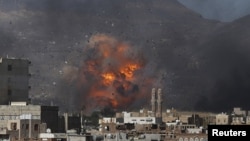A five-day humanitarian cease-fire is under way in Yemen to give the United Nations a chance to bring in badly needed food and relief to battered civilians.
The pause in fighting took effect late Tuesday, with Shi'ite Houthi rebels and the Saudi-led coalition battling nearly up to the last minute.
Coalition spokesman Ahmed al-Assiri said the Saudis are committed to the truce, but will continue monitoring the rebels through intelligence and reconnaissance flights.
Assiri told the French News Agency, "We will be ready to react to any violation of the pause."
The rebels also say they will respond if the truce is broken.
U.N. relief agencies are ready to bring in emergency food, blankets, plastic sheeting and other vital supplies to hundreds of thousands of Yemeni civilians.
Many have seen their homes destroyed by coalition airstrikes and shelling by the Houthis, who have forced the president to flee the country.
The U.N. says the fighting has killed about 1,500 people since the airstrikes began in March. U.N. special envoy Ismail Ould Cheikh Ahmed is in the Yemeni capital, Sana'a, to try to bring all sides to the negotiating table and ensure the truce holds.
Meanwhile, the U.S. is monitoring an Iranian cargo ship heading to Yemen, apparently carrying humanitarian supplies.
The White House said it expects the Iranians to go through the process that the United Nations has set up - docking in Djibouti, where U.N. experts process the relief for proper and efficient distribution to Yemeni civilians.
"Iran understands that they can't afford to play games with humanitarian assistance to people who are in dire need," White House spokesman Josh Earnest said Tuesday.
"The Iranians know as well as anyone that a political stunt to defy their regional rivals outside the U.N. system is provocative and risks a collapse of the U.N.-led humanitarian cease-fire."
Earnest also said the U.N. system ensures that the arms embargo against the Houthi rebels is enforced.
Envoy arrives
Regardless of how well the cease-fire holds, Rupert Colville of the U.N. human rights commission said fuel imports to Yemen must be resumed so aid workers can deliver goods and services. He said last week was the most violent in the conflict since March 26, with nearly 200 civilian deaths, half of them women and children.
U.N. humanitarian chief Valerie Amos also pleaded with all parties to halt the violence and let aid workers deliver food, provide medical care, ensure access to clean water and allow people to escape to safer areas.
"Given the deteriorating humanitarian situation on the ground in Yemen with hundreds of thousands of vulnerable civilians trapped in the middle of fighting and unable to access lifesaving aid, it is essential that this pause materialize," Amos said in a statement.
Little hope of accord
Dalal Abdullah, a human rights activist in Sana'a, said the Yemeni people were increasingly without hope that politicians would be able to negotiate a settlement, because every political group in the country has taken part in the destruction of Yemen.
Past cease-fires have frequently failed, breaking down within hours.
Ahmed Abdulsalam, an accountant in Sana’a, said that even if a cease-fire did hold long enough for some measure of aid to get in, it wouldn't last. He said fighting would resume because the peace process doesn’t include all parties.
The conflict involves Houthi rebels who took control of the capital in September, then pushed to the south in an offensive earlier this year that forced President Abdu Rabu Mansour Hadi to flee to Saudi Arabia. The Saudis and other allies launched their airstrikes against the Houthis in late March at the request of Hadi.
But these sides don't include other fighting groups, like tribal militias, al-Qaida and the Islamic State.
Many Yemenis believe all the fighting groups represent foreign interests, and that Yemen’s factions, if left alone, could build a peaceful government.
At a pharmacy in Sana’a, Osama Al-Shobi said he thought talks in the Saudi capital, Riyadh, scheduled to begin May 17, could end the fighting. The Yemeni people, he said, are not nearly as polarized as they seem and share a desperate need for peace and economic recovery.
VOA's Heather Murdock contributed to this report. Some information for this report came from Reuters and AP.





